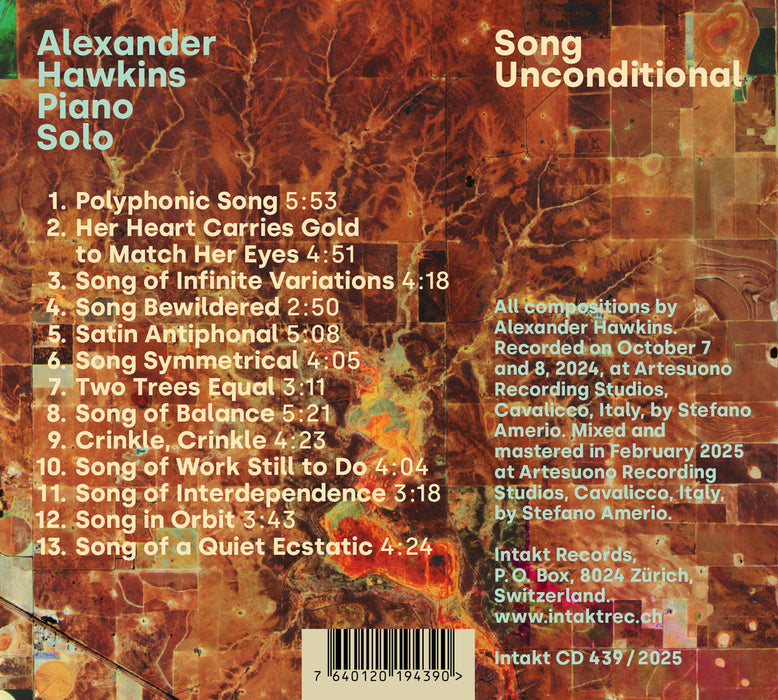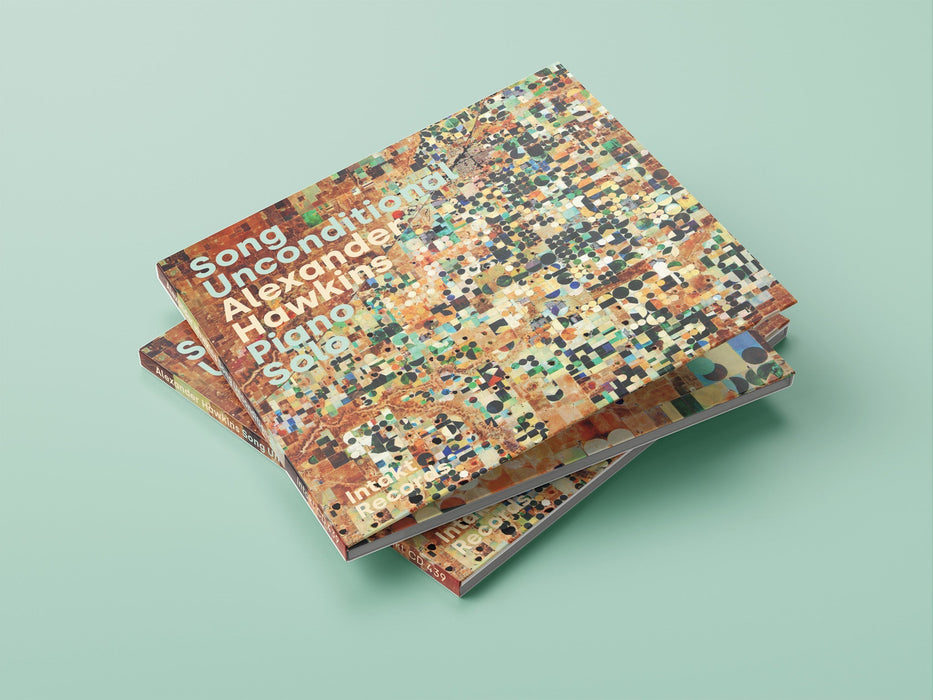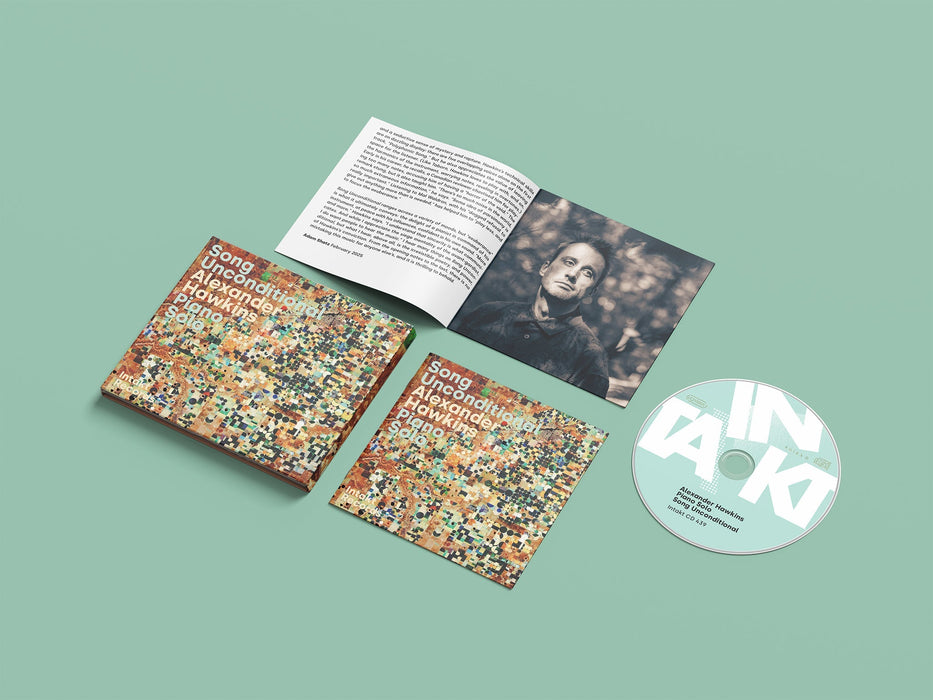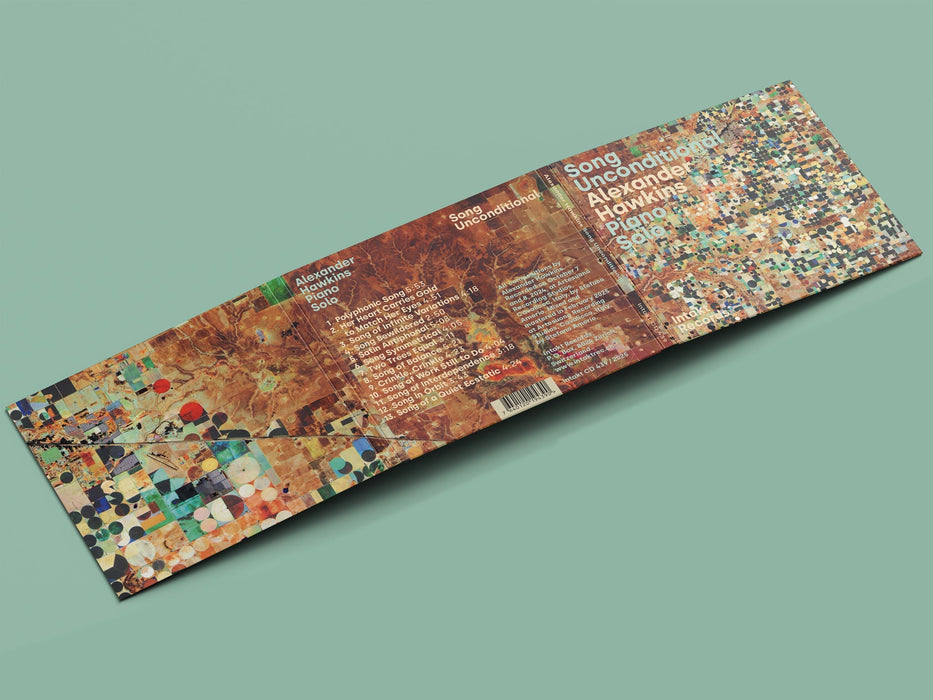





439: ALEXANDER HAWKINS. Song Unconditional – Piano Solo
Intakt Recording #439/ 2025
Alexander Hawkins: Piano
Recorded on October 7 and 8, 2024, at Artesuono Recording Studios, Cavalicco, Italy, by Stefano Amerio. Mixed and mastered in February 2025 at Artesuono Recording Studios, Cavalicco, Italy, by Stefano Amerio.
More Info
British pianist and composer Alexander Hawkins is one of Europe’s most innovative pianists, working in a variety of creative contexts and always constructing a unique sound world. As a style-defining and imaginative voice in contemporary jazz, Hawkins provides further testimony to the art of his solo playing, six years after his last solo album (Intakt #330). Song Unconditional is as playful as it is intense – firmly rooted in tradition, yet endlessly searching and adventurous. Each of the 13 short pieces explores one or more expressive possibilities of the piano and are, in the words of Adam Shatz in the liner notes, “... marvels of compressed exploration. To listen to them in succession, as they’re meant to be heard, is to enter a vast, sophisticated, and deeply considered sound-world. Song Unconditional is also gorgeous, sometimes startlingly. It belongs, I think, in the company of the most impressive solo piano albums of recent years, notably Craig Taborn’s Avenging Angel and David Virelles’ Nuna."
Album Credits
Alexander Hawkins: Piano
All compositions by Alexander Hawkins. Recorded on October 7 and 8, 2024, at Artesuono Recording Studios, Cavalicco, Italy, by Stefano Amerio. Mixed and mastered in February 2025 at Artesuono Recording Studios, Cavalicco, Italy, by Stefano Amerio. Cover art contains modified Copernicus Sentinel data (2019), processed by ESA. Graphic design: Jonas Schoder. Liner notes: Adam Shatz. Photo: Edu Hawkins. Produced by Alexander Hawkins and Intakt Records. Published by Intakt Records. Executive Producer: Florian Keller. Intakt Records, P.O. Box, 8024 Zürich, Switzerland. www.intaktrec.ch
Last but not least, polymath Alexander Hawkins recently released an album that is both his most personal statement to date and an ode to the creative music tradition. In contrast to his previous solo outing, the nearly as impressive Iron Into Wind, he now sought to render his modular compositions even more concise and cohesive: “marvels of compressed exploration” (as Adam Shatz puts it in his liner notes) that, taken together, form a most satisfying suite. A masterclass in counterpoint, assisted by a recording of exceptional clarity, Song Unconditional is both extremely broad in its references and a work of great stylistic unity, being as true to the spirit of the AACM as any music made today.
https://daily.bandcamp.com/lists/contemporary-creative-music-solo-piano-album-guide?utm_source=notification
“Libertà di” piuttosto che “libertà da” resta un principio tra i più importanti mutuati dal movimento della capitale AACM da parte di Alex Hawkins, libero percussore della tastiera britannico, di passaporto ormai internazionale.
Appare superfluo, al presente punto di carriera del medesimo, evidenziare come egli si sia investito lungo molteplici canoni espressivi e diverse soluzioni aggregative, ma in particolare alla forma solo il pianista ha destinato focale attenzione dedicandovi a cadenza circa quinquennale già tre album, aprendo nel 2015 con Song Singular, seguito nel 2019 da Iron Into Wind, approdando ora al presente Song Unconditional.
Se, nelle opinioni dello scrivente, la forma solistica può non aspirare a modello di perfezione ma può proporsi come momento di verità, stanti le componenti almeno introspettive, lasciamo allo stesso Hawkins alcune considerazioni introduttive, tratte da una nostra intervista appena raccolta:
“Amo immergermi in diverse situazioni musicali, ma il lavoro da solista offre un’opportunità molto particolare di auto espressione, offre un’affascinante opportunità per una rappresentazione molto distillata dei pensieri musicali… Potrei ovviamente parlare in termini molto tecnici della musica dei tre album, ma trovo estremamente difficile farlo in termini più generali: sento tuttavia che gli album sembrano rappresentare una sorta di sviluppo e approfondimento di un concetto. Non riesco ad articolare bene il “come”, ma in parte dipende da una maggiore padronanza dello strumento e dalla mia capacità di tradurre nella mia testa i suoni dal “mondo esterno”.
Dall’introduttiva Polyphonic Song , solo in parte a ragione del suo titolo, si palesano apparenti connessioni con la classicità, traccia magari un po’ fuorviante nell’inquadramento dei materiali, puntanti a linearità moderniste. Si potrà rilevare assonanza con certa letteratura del Novecento (vaghe connessioni ai mondi pianistici di un Bartok o Debussy, andando a superficiale memoria), analogia formale che però ne condivide almeno il nitore interrogativo.
Di contrastante natura invece l’ipnotica frenesia di Song of Infinite Variations, d’andamento teso e labirintico, che catarticamente transita nell’esposizione rada e nei flussi laminari di Song Bewildered, laddove il sensibile titolo Satin Antiphonal allude piuttosto ad un passo nervosamente erratico ed una timbrica plumbea e coalescente. Disarmante meraviglia nel clima dimesso dell’introvertita Song Symmetrical, scabre e scheletriche figurazioni da danza jazz nell’inquieta Two Trees Equal, da confrontarsi con gli spigolosi fermenti della lievitante Crinkle, Crinkle.
La sequenza dei titoli delle ‘song’ occupa il quarto finale della raccolta, dispensando in quattro passaggi altrettanti saggi tematici di suggestiva concisione, non priva di senso allegorico, aggiornandoci (solo provvisoriamente) sui bilanci formali del pianista, che implicitamente suggella l’ulteriore smarcamento dai vincoli semantici dalle più condivise formule jazz.
Vivida ed equilibrata la ripresa ad opera dell’engineer Stefano Amerio, abitualmente impeccabile, che con equanimità accompagna la ben amministrata performance, opportunamente differenziata in una personale disamina dell’apparato pianistico e delle sue innumerevoli filiere espressive e timbriche; in ciò, sembra che il Nostro s’ingegni di evocare uno spirito unificante delle glossae dello strumento, con misurata partecipazione fisica.
Ma ad un livello che più responsabilmente dignifichi la dimensione formale, pur priva di velleitarie forzature innovative, s’autorizza l’apertura di nuovi ed importanti interrogativi, anzi s’avalla l’idea che i materiali sottendano istanze filosofiche di cui apparrebbe pervasa l’intera produzione individuale del Nostro, se considerata prospetticamente.
Pur convenendo, come dalle note, che “ciascuna delle 13 tracce dell’album esamina una o più possibilità espressive del pianoforte (polifonia, antifonia, voci accordali in contrappunto, blocchi accordali, contrasti di dinamica, altezza e timbro)”, e in parte confortati da altre preliminari posizioni di Hawkins (“pur apprezzando la mentalità da assedianti degli avanguardisti, io voglio che le persone ascoltino la musica”), preferiamo dunque investire questa esperienza d’ascolto nelle ultime considerazioni, rilevando come nel complesso l’urgenza (legittima e vitale) dell’innovazione speculativa ceda la priorità, più opportunamente, ad una sentita esigenza di meditazione introspettiva.
https://www.soundcontest.com/alexander-hawkins-unconditional-song/
L’auditeur non averti qui écoute Alexander Hawkins pour la première fois pourrait éprouver un sentiment biaisé envers sa musique tant elle ne s’appréhende guère aisément. De toute évidence, Hawkins aime l’abstraction. Ce n’est pas un hasard s’il voue une admiration à Cecil Taylor mais aussi à György Ligeti. Hawkins a étudié le piano dès l’âge de dix ans et, poussé par un père mélomane, il s’est intéressé autant à la musique classique qu’au jazz, de sorte qu’il n’a jamais opéré de scission entre les deux. Ces deux sources ont profondément inspiré sa démarche et son jeu. Et peut-être doit-il autant à Bach qu’à Monk. « Song Unconditional » est un album pour piano solo. Ce n’est pas son premier (on notera « Iron Into Wind » sorti en 2019, également sur Intakt). Il aligne treize compositions, toutes écrites par ses soins, qu’il qualifie de « modulaires » au sens où il peut les retravailler quand il les exécute tandis qu’elles ne sont pas encloses dans une durée ou un tempo assignés. Pour autant, Hawkins se plait à les intituler comme des chansons : « Polyphonic Song », « Song of Infinite Variations », « Song Bewildered », « Song Symmetrical », « Song of Balance »… C’est que pour chacune d’elles, il explore un terrain d’exercice différent : la polyphonie, l’antiphonie, le contrepoint, les contrastes dynamiques, les timbres… Il faut s’y reprendre à plusieurs écoutes pour saisir les nuances d’un jeu dense, fouillé, d’une grande dextérité, mais également d’une complexité patente. Il n’y a ici rien de gratuit, rien de conditionnel.
https://jazzmania.be/alexander-hawkins-song-unconditional/
Where on the first solo outing by British pianist Alexander Hawkins, Song Singular (Babel, 2014), his influences strode in plain sight, and the second, Iron Into Wind (Intakt, 2019), in its austerity, nodded toward Hawkins' classical schooling, Song Unconditional feels simultaneously more personal and more welcoming. It finds Hawkins not only consolidating the vocabulary of his earlier output but distilling it into something strikingly self- assured.
Since that initial unaccompanied foray, Hawkins has become one of the most in demand voices in modern improvised music. A valued colleague of Anthony Braxton, Joe McPhee, Nicole Mitchell, and Evan Parker, among others, he draws from an expansive range—both his encyclopedic command of the jazz canon and deep affinity for classical idioms inform a technique that is as rigorous as it is imaginative. The material stems from a lockdown-era correspondence with regular collaborator cellist {[Tomeka Reid}}, in which the pair challenged one another to compose a piece daily for 100 days. Hawkins' notebooks from that time hold the genesis of these 13 short cuts which retain the vim and vigor of the best extemporizations.
Just because Hawkins is alone in the studio does not mean that he has to abandon the layerings and juxtapositions which are a feature of so many of his ensembles. His prodigious hand independence keeps multiple plates spinning -as lines part company, run parallel or intersect, sometimes clashing, sometimes coalescing into unexpected structures. On "Two Trees Equal," this contrapuntal thinking takes center stage, a high-velocity exchange that teeters between dialogue and divergence. "Song of Interdependence" recalls the astringent lyricism of early Keith Jarrett filtered through the player piano works of Conlon Nancarrow, evoking a kinetic, breathless momentum.
Melodies here tend to be elusive and fragmentary, but Hawkins knows how to make them linger. "Satin Antiphonal" introduces one of the album's most arresting motifs: clipped upper-register figures sparring with a jabbing, low-end pulse, thickening in texture as it moves toward a richly sonorous close. Nonetheless, "Song of Balance" stands as the clearest homage to the lineage of Duke Ellington and Thelonious Monk.
Many numbers unfold into self-contained sound worlds. There is little conventional resolution in Song Unconditional, but Hawkins never aims for closure. Instead, he favors a modular approach, crafting miniatures that hover, suggesting more than they declare. The final track, "Song of a Quiet Ecstatic," gestures toward leave-taking, but with a provisional feel—an ending that doubles as an invitation.
In his most personal solo offering to date, Hawkins does not just straddle the line between improvisation and composition—he renders it moot. The result is a compelling suite that reveals itself with a sense of intricate, evolving possibility.
https://www.allaboutjazz.com/song-unconditional-alexander-hawkins-intakt__16280
Dieser Sommer ist gut gefüllt mit Piano Solo. Neben Sophie Agnel, Stephen Grew, Matt Mitchell und Amina Claudine Myers, um nur einige zu nennen, sticht vor allem der britischen Pianist Alexander Hawkins mit Herz-****. ..Song Unconditional" ist seine dritte Soloaufnahme und spiegelt sowohl die Verfeinerung seiner Technik, als auch die Weiterentwicklung seiner Signatur. Hawkins fasziniert durch Reduktion auf das Wesentliche. Überwältigung interessiert ihn nicht, seine Musik ist Freiheit pur. Dennoch fesseln seine kompakten Kompositionen mittels einer Fülle von Emotionen. Hawkins nutzte alle Mittel seiner Kunst, um mit Polyfonie, Kakofonie, mit alter Stim mung und neuen Klangfarben das gute alte Piano zum Leuchten zu bringen. Wer das weite Spektrum seiner Interessen, von polyphon singenden Pygmäenstämmen Zentralafrikas, Gamelan aus Bali, über Klassik bis hin zur zeitgenössischen Musik kennt, ahnt womit seine Synapsen aufgeladen sind. Kein Wunder also, wenn er uns zunächst radikal Neues zwischen die Ohren knallt, um uns im nächsten Augenblick in rosa Zuckerwatte zu betten. Lieblingslied „Song Of Work Still To Do" - too good to be true.
https://drive.google.com/file/d/1Y7HI-FC-LvJPozgrpZZVcmAvcKFj--9-/view?usp=drive_link
"Dieser Sommer ist gut gefüllt mit Piano Solo. Neben Sophie Agnel, Stephen Grew, Matt Mitchell und Amina Claudine Myers, um nur einige zu nennen, sticht vor allem der britischen Pianist Alexander Hawkins mit Herz-****. ..Song Unconditional"" ist seine dritte Soloaufnahme und spiegelt sowohl die Verfeinerung seiner Technik, als auch die Weiterentwicklung seiner Signatur. Hawkins fasziniert durch Reduktion auf das Wesentliche. Überwältigung interessiert ihn nicht, seine Musik ist Freiheit pur. Dennoch fesseln seine kompakten Kompositionen mittels einer Fülle von Emotionen. Hawkins nutzte alle Mittel seiner Kunst, um mit Polyfonie, Kakofonie, mit alter Stim mung und neuen Klangfarben das gute alte Piano zum Leuchten zu bringen. Wer das weite Spektrum seiner Interessen, von polyphon singenden Pygmäenstämmen Zentralafrikas, Gamelan aus Bali, über Klassik bis hin zur zeitgenössischen Musik kennt, ahnt womit seine Synapsen aufgeladen sind. Kein Wunder also, wenn er uns zunächst radikal Neues zwischen die Ohren knallt, um uns im nächsten Augenblick in rosa Zuckerwatte zu betten. Lieblingslied „Song Of Work Still To Do"" - too good to be true.
Mit Song Unconditional (Intakt CD 439) offeriert ALEXANDER HAWKINS, parallel zu „Two
for Keith“ im Duett mit Giovanni Maier, ein neues Piano-Solo. Als Tasten nach dem 'Unerhörten'
und Demo des Gekonnten. Sein Faible für Bartok, Janáček, Ligeti dabei so groß
wie sein Dank an Heroen wie Geri Allen, Maurizio Pollini, Cecil Taylor, Mal Waldron. Nach
zuletzt Tomeka Reid, Elaine Mitchener, Mulatu Astatke oder Sofia Jernberg als gesuchten
Herausforderungen bringt er nun 13 rhythmische Ideen oder harmonische Motive zum
Erklingen – polyphon, antiphonal, symmetrisch, variabel, ausbalanciert, verwirrt. Selbst
am Gegenpol zu den hingerissen schwärmenden Linernotes besticht, wie Hawkins sich da
in bedächtigem Hintersinn, kristalliner oder schattiger Kühle, ostinatem Drang, virtuoser
Verdichtung und zuletzt mit 'Song in Orbit' und '...of a Quiet Ecstatic' doppelt betonter
poetischer Demut in die vordringlichen unter seinen Möglichkeiten vertieft.
Den engelske pianisten Alexander Hawkins er i mine ører en av de aller viktigste nye stemmene i pianojazzens univers.
Den 44 år gamle Alexander Hawkins har sakte, men sikkert etablert seg på ei stadig høyere hylle i jazzens verden. Hadde han ikke kommet fra fotballøya, men fra det som en gang var det forjettede land, så hadde
Hawkins hatt jazzikalsk verdensherredømme allerede. Med hans ferske solo-visittkort på plass, så er det uansett å håpe at store deler av musikkverdenen får oppleve hans genialitet.
Forskjellige settinger
Hawkins, født og oppvokst i en akademikerfamilie i Oxford med en svært musikkinteressert far, har gått den relativt tradisjonelle veien via klassisk musikk før improvisert musikk fikk en stadig viktigere plass i livet hans. Bach og Ligeti og seinere Bartók har vært viktige inspirasjonskilder for Hawkins og er det fortsatt og måten han har kombinert det med filosofien til Chicago-kollektivet AACM og pianister som Craig Taborn, David Virelles og tidligere retningsgivere som Mary Lou Williams, Mal Waldron og Cecil Taylor, har ført til et helt unikt solopiano-uttrykk.
Korte låter
Det strålende og informative tekstheftet til cd-en, slikt finnes ikke i strømmeuniverset gitt, forteller oss hvor Hawkins kommer fra og hvordan disse 13 landskapene har vokst frem. Her er det mange typer
stemninger skapt av en teknisk briljant pianist som ikke bruker teknikken til å imponere, men til å skape noe høyst inderlig basert på inspirasjonskilder og omskapt til hans svært personlige språk.
Her er det mulig å høre noe lyrisk, varmt og empatisk – musikk skapt ut av kraft og overbevisning. Dette er musikk skapt av Alexander Hawkins og som ikke kunne vært unnfanget av noen andre. Fantastisk!
https://torhammero.blogg.no/en-av-de-nye-store-6.html
Mit Song Unconditional (Intakt CD 439) offeriert ALEXANDER HAWKINS, parallel zu „Two for Keith“ im Duett mit Giovanni Maier, ein neues Piano-Solo. Als Tasten nach dem 'Unerhörten' und Demo des Gekonnten. Sein Faible für Bartok, Janáček, Ligeti dabei so groß wie sein Dank an Heroen wie Geri Allen, Maurizio Pollini, Cecil Taylor, Mal Waldron. Nach zuletzt Tomeka Reid, Elaine Mitchener, Mulatu Astatke oder Sofia Jernberg als gesuchten Herausforderungen bringt er nun 13 rhythmische Ideen oder harmonische Motive zum Erklingen – polyphon, antiphonal, symmetrisch, variabel, ausbalanciert, verwirrt. Selbst am Gegenpol zu den hingerissen schwärmenden Linernotes besticht, wie Hawkins sich da in bedächtigem Hintersinn, kristalliner oder schattiger Kühle, ostinatem Drang, virtuoser Verdichtung und zuletzt mit 'Song in Orbit' und '...of a Quiet Ecstatic' doppelt betonter poetischer Demut in die vordringlichen unter seinen Möglichkeiten vertieft. [BA 128 rbd]
Erano ben sei anni che Alexander Hawkins non pubblicava un album da solista e devo ammettere che pur se i suoi multiformi lavori, con altri musicisti in varie formazioni, sono sempre stati di qualità elevatissima, il “piano solo” è sempre, a dir poco, strabiliante. Quale è la forma del jazz contemporaneo al pianoforte? Se per altri valenti compositori potremmo dire che “è anche questo”, per Hawkins credo si possa affermare che “è questo”, poiché in lui, come in pochi altri, la mutevolezza, la poliformità, l’imprevedibilità, il rigore nella casualità dell’improvvisazione, tutto questo e tutto insieme, vi trovano dimora. La musica di Alexander Hawkins è classica, ma fuori misura, è canonicamente jazz, ma senza regole immutabili.
Del resto, anche per formazione musicale e culturale, Hawkins studia la classica, la musica contemporanea (la cosiddetta musica colta) e il jazz e lo fa sincronicamente e questo non poteva certa non avere conseguenze nel suo “modus operandi”. Se ascoltando Song Bewildered (che allude a un pezzo inedito del trombettista Bill Dixon, un maestro dell’inquietudine), tratto da questo suo eccezionale album intitolato Song Unconditional, vi vien da pensare a Debussy o se ascoltando Song of A Quiet Ecstatic la vostra mente vi porta al ricordo di una quasi dimenticata Gymnopedye o ad un recondito Nocturne di Satie e se inoltre, magari, Polyphonic Song vi fa pensare a qualche parte del Munich Concert di Keith Jarrett, non temete, non è la vostra capacità di definire la musica di Hawkins a far difetto, ma solo la sua capacità, di inglobare nelle sue composizioni, echi della storia della musica classica e del miglior jazz, ricreandone armonie, frasi, ritmi, toni, stilemi e, soprattutto atmosfere, pur nella sua continua ed originalissima ricerca. Sì, si tratta proprio di Song Unconditional, perché per Hawkins sembra che il pianoforte nasconda un segreto e che questo segreto lo si possa svelare, solo ed esclusivamente, dopo aver sfogliato lo strumento come una cipolla, dopo aver cercato tutte le combinatorie possibili ed immaginabili dei suoni, solo dopo averlo “fatto cantare” sotto una soave tortura. E non è detto che il segreto dello strumento alla fin fine sia svelato. Hawkins, utilizza tutto ciò che la scrittura musicale mette a disposizione: polifonia, antifonia, voci accordali in contrappunto, accordi a blocco, contrasti di dinamica, altezza e timbro, la continua ed estenuante ricerca, fatta con il pianoforte e non solo sul pianoforte, rivela il potere di incommensurabile suggestione che la musica porta con sé. Nelle note di copertina che accompagnano il disco, Adam Shatz scrive di “meraviglie di esplorazione condensata” e aggiunge che Song Unconditional è uno degli album per pianoforte solo più impressionanti degli ultimi anni, insieme ad Avenging Angel di Craig Taborn e Nuna di David Virelles. Mi piacerebbe aggiungere a questi eccellenti lavori anche Splash di Myra Melford di cui ho scritto da queste pagine qualche tempo fa, come mi piace ricordare anche Alexander, seduto poco distante da me, mentre incantato ascoltava Myra Melford nel magnifico concerto di Palazzo Bellini in occasione di NovaraJazz Festival 2024.
L’indicazione è quella di ascoltare l’intera serie dei brevi brani come proposti dal disco, ma è evidente che poi ognuno di noi possa indugiare e farsi rapire da qualche singolo brano, come è capitato a me con lo struggente Her Heart Carries Gold To Match Her Eyes, con quell’incedere profondo e solenne sul quale altri suoni sembrano cercare una propria vita autonoma. Adoro i brevi accordi cristallini e “mattutini”, come da un corpo che si risveglia, di Polyphonic Song, così come amo l’aspetto più di ricerca jazz di Satin Antiphonal. Il fatto è che Alexander Hawkins è un musicista completo, maturo pur nella sua infaticabile ricerca, è un compositore, per così dire, “esaustivo” con una non comune capacità di farsi attraversare dalla musica, anzi dalla cultura musicale di almeno due secoli. Il bello è che Alexander Hawkins ha 44 anni ed è facile immaginare quante strade ancora inesplorate potrà ancora percorrere. Per la nostra gioia.




